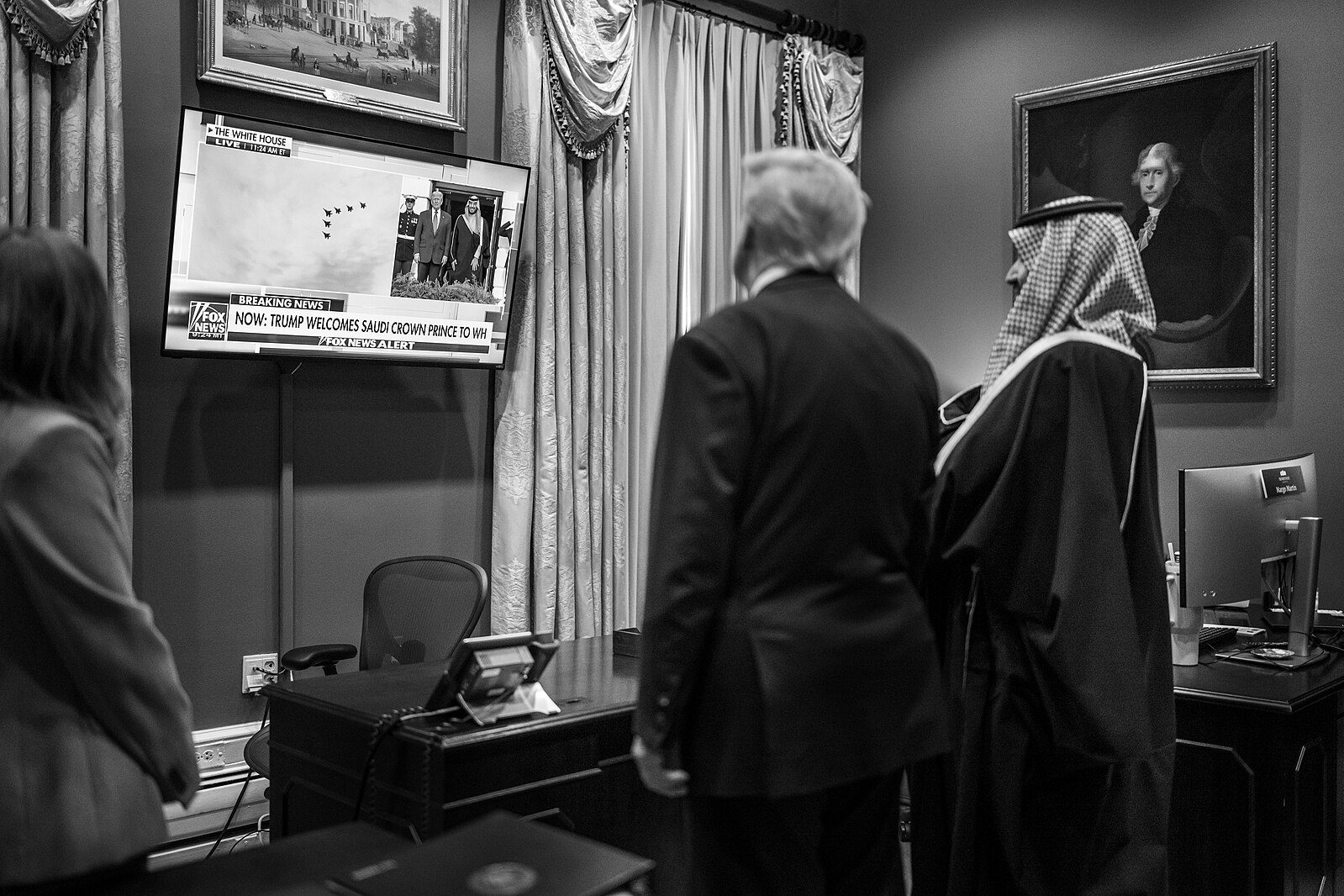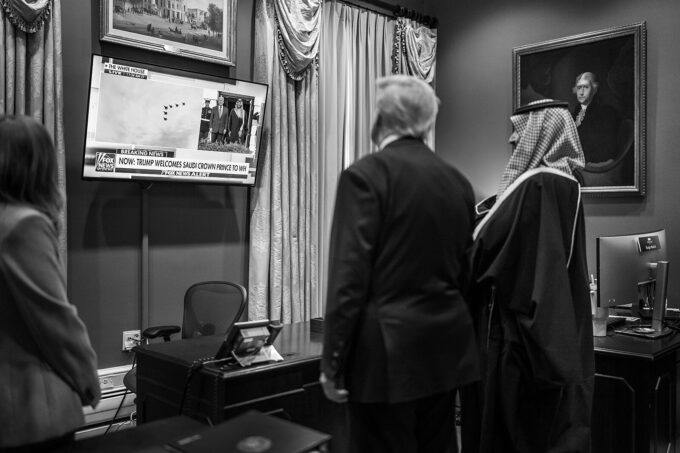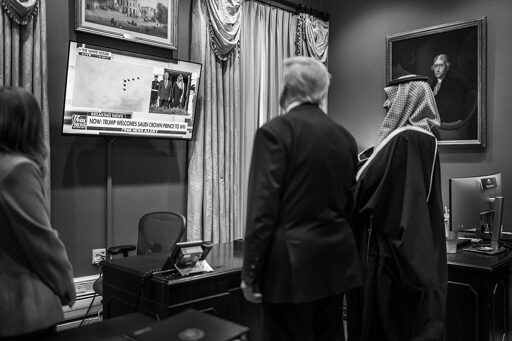

Photograph Source: The White House – Public Domain
The Saudi Arabian Crown Prince Mohammed bin Salman is at it again. Gulling, wooing, and grinning his way into the establishment of another country, he is greasing palms and making deals. Effusive and flattering of his host, this time US President Donald Trump, he received a state welcome on November 18 rarely afforded visiting dignitaries: a red carpet viewing of fighter jets, a horse mounted guard of honour, and feast in the East Room. He was also promised the much sought after F-35 fighter jets as part of a defence arrangement elevating Saudi Arabia to the status of “major non-NATO ally”. Along the way, MBS has done much to deter those who wish to remind him of a wretched human rights record and the barbaric habits of a state he claims to be modernising.
The gaudy occasion risked being sullied by a question from Mary Bruce of ABC News. Intended for the Crown Prince, it inquired about his role behind the murder of dissident Saudi journalist Jamal Khashoggi in a Saudi consulate in Istanbul on October 2, 2018. The death squad responsible for strangling and dismembering the unsuspecting Khashoggi had been dispatched with his blessing, numbering among them a forensic specialist, a bone saw and a body double. Many of its members hailed from bin Salman’s own protective guard, the Rapid Intervention Force.
Trump’s intervention was abrupt: “You’re mentioning someone that was extremely controversial. A lot of people didn’t like that gentleman that you’re talking about. Whether you like him or didn’t like him, things happen. But he [MBS] knew nothing about it. You don’t have to embarrass our guest.”
His guest has much to be embarrassed about, and more besides. With surliness and much petulant audacity, the opportunistic princeling has seized such power in the realm as to marginalise all other decision makers, including rival family members. The most important decisions, be they on vast investment agreements, the refurbishment of the country’s medieval bearing, or authorising the extrajudicial killing of an irritating scribbler, would issue from him.
To therefore suggest that the Crown Prince was ignorant of his own misdeeds is to fly in the face of hardened reality. When she was UN Special Rapporteur on extrajudicial, summary and arbitrary killings, Agnès Callamard found that state responsibility for Khashoggi’s death was the only plausible conclusion. “His killing was the result of elaborate planning involving extensive coordination and significant human and financial resources. It was overseen, planned and endorsed by high-level officials. It was premeditated.”
Most importantly, Trump’s breezy acquittal of MBS’s culpability resoundingly ignores the findings by the Office of the Director of National Intelligence in a 2021 declassified report submitted to Congress by the then Director of National Intelligence Avril Haines. “We assess,” the report avers, “that Saudi Arabia’s Crown Prince Muhammad bin Salman approved an operation in Istanbul, Turkey to capture or kill Saudi journalist Jamal Khashoggi.” This was the only reasonable conclusion given bin Salman’s “control of decisionmaking in the Kingdom”, the seminal role played by one of his key advisors and members of the Crown Prince’s protective detail in the operation, along with bin Salman’s appetite “for using violent measures to silence dissidents abroad, including Khashoggi.”
The report goes on to make a most telling observation: that the Crown Prince’s assumption (one might even say seizure) of “absolute control of the Kingdom’s security and intelligence organizations” since 2017 made it “highly unlikely that Saudi officials would have carried out an operation of this nature without” his approval. Some equivocation is expressed about “how far in advance Saudi officials decided to harm” Khashoggi.
Bin Salman, for his part, reverted to his role as high minded reformer while citing the defence of mistake. This was at least partially in keeping with previous admissions that his hands were not entirely clean on the subject. (Khashoggi’s widow, Hanan, reiterated that point in an interview with BBC Newsnight.) It had been “painful for us in Saudi Arabia”, he told Bruce. “We did all the right steps of investigating, etc., in Saudi Arabia, and we’ve improved our system to be sure that nothing happens like that again. And it’s painful, and it was a huge mistake.” Trump also gave his guest the needed ballast: “What’s he done is incredible in terms of human rights and everything else.”
Since Khashoggi’s murder, the response from the Kingdom has been one of denial, distancing and detachment. It has involved isolating the killers as wayward enthusiasts and adventurers, lacking the force of a mandate. They were to be the convenient scalps, the necessary sacrifices. Of the group, five were subsequently sentenced to death while three were given prison sentences. Saud al-Qahtani, bin Salman’s disseminator of venomous social media, along with Maj. Gen. Ahmed al-Asiri, were acquitted for lack of evidence. Callamard was compelled to remark that, “The executioners were found guilty and sentenced to death” while “those who ordered the executions not only walk free but have barely been touched by the investigation and the trial.” That’s the MBS version of modern Saudi Arabia for you.
The post Trump, the Crown Prince and Killing Khashoggi appeared first on CounterPunch.org.
From CounterPunch.org via this RSS feed


